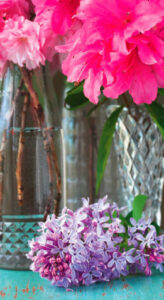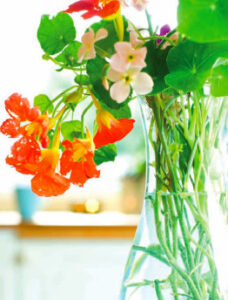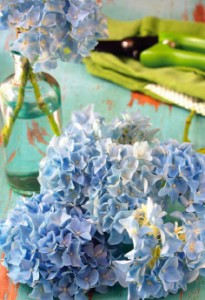EVERYDAY BEAUTY Arranging Cut Flowers
 A wise friend once told me that if you have fresh flowers around the house, you will no longer notice the imperfections of your home. (What dust bunnies under the couch?) The loveliness of the flowers helps you focus on the beauty of nature and the happiness in your home. My friend was on to something: Flowers have a way of adding cheer to any space by reminding us of the joy in simple things.
A wise friend once told me that if you have fresh flowers around the house, you will no longer notice the imperfections of your home. (What dust bunnies under the couch?) The loveliness of the flowers helps you focus on the beauty of nature and the happiness in your home. My friend was on to something: Flowers have a way of adding cheer to any space by reminding us of the joy in simple things.
We are fortunate that Virginia’s rich soil and temperate climate allows for a long season of colorful blooms. Take advantage of the abundant beauty right outside your doorstep to add a splash of color and a touch of fun to your home with very little expense.
Selecting the Right Vase
Your vase sets the tone for your arrangement and should provide an interesting contrast to the design. It should complement but not overpower, provide a sense of balance and proportion, and enhance the display through shape, form, color and texture. Use these basic guidelines to help select the most appropriate container to support your flowers.
URN-SHAPED VASES work best with flowers with flexible stems (tulips) or large blooms (peonies). The lip helps support the blossoms while allowing the flowers room to breathe. It is dramatic to use an urn-shaped vase with a sturdy flower (calla lilies, sunflowers) or flowering branch (dogwood, forsythia, crabapple) in the middle and a flower ring around the edge (a good use for mums or carnations).
BUBBLE VASES are suited for vine flowers (sweet peas) as they allow air to circulate around the loose arrangement. These vases also are perfect for spiky flowers (delphinium). Or you may choose a more simplistic approach—a single bloom (magnolia) floating in distilled or sparkling water.
 CYLINDRICAL VASES are perfect for thick-stemmed branches and blooms (sunflowers, hydrangeas, snapdragons, gladiolus). The height and narrow design help support the flowers while creating a loose, informal look.
CYLINDRICAL VASES are perfect for thick-stemmed branches and blooms (sunflowers, hydrangeas, snapdragons, gladiolus). The height and narrow design help support the flowers while creating a loose, informal look.
SQUARE VASES offer support to smaller, top-heavy flowers (daffodils, hyacinths, dahlias, calla lilies). These flowers make an elegant yet simple statement through the interesting contrast between the angular shape of the vase and the delicate head of the flower.
BUD VASES and flimsy stems are a winning combination, as the slender neck of the vessel will support dainty blossoms (poppies, freesias). A grouping of vases in different heights usually makes the most dramatic impact.
ROUNDED VASES have liberal openings which enable sturdy, round-headed flowers to be grouped for a stunning effect (roses, daises, ranunculus). Rounded vases also provide a natural fit when a variety of flowers are being used.
A Bold Idea
One of the best ways to make a statement is to choose an interesting vessel for your arrangement. For a more traditional, formal approach you may wish to use shining silver footed bowls, sturdy urns, festive julep cups and gorgeous cut crystal. However, everyday items make great vases too—think handmade pottery, bright kitchen bowls and pitchers, colorful take-out boxes, galvanized tins, conch shells, recycled bottles and more. Anything can be made into a vase with a little creativity; don’t be afraid to experiment with different objects to give those cheerful blooms a new lease on life. Even items like inexpensive glass vases and old plastic food containers can be made into a stunning base for your flowers when colorful ribbons, rose petals or leaves are hot-glued to the outside to mask the vessel’s original purpose.
Groupings Galore
Grouping smaller, similarly shaped vases is an easy way to add a wow factor to your table in lieu of a large floral arrangement. Tie the elements together by using complementary hues and colors in a variety of shapes and textures. Anchor these arrangements with candles and petals strewn around the grouping. Make the table more interesting by using varying heights of the same-shaped vase.
Single blooms look great in bright-colored cylinders. Glass fish bowls or square cubes can be stacked on top of each other with flowers (think daisies, irises, hydrangeas, or zinnias) floating in water or with vines (such as orchids or gloriosa) twisted inside the bowl. Experiment with the angles of the containers at various degrees to create a more interesting effect.
A Touch of Sass
One hot trend in floral arranging is including fruits in your container; cut oranges, lemons and limes add a fun punch of color. Keep in mind, though, that such additions can decrease the freshness and longevity of the arrangement. Rocks, seashells, glass beads and sand also add interesting textures to an arrangement.
Shocking blues, bright pinks and vivid greens add an unexpected burst of color in the base. Add food coloring to the water, but shield the flowers by submerging them in a separate container within the vase (remember the elementary school science experiment with colored water and the carnation?). Judy Gunter, a floral designer of Designs 4 All Seasons, recommends adding Acolytes or Floralytes—battery-operated LED lights that come in a vast array of colors. These sticks can add impact to your arrangements, especially if you are designing something for an evening event.
 Tips of the Trade
Tips of the Trade
Before you begin to arrange your flowers, you should gather all tools that you may need. The most important tool you will use will be a sharp knife, clippers or bypass pruners (for thick, woody stems). Do not use regular scissors to trim as the scissors will crush the stem and shorten the life of the flowers. After trimming the stems, immediately place the fresh-cut flowers in water; have a bucket of water nearby in which to place the cut stems until you are ready to arrange them.
Most professional floral designers recommend cleaning the container with a solution of water and bleach to remove any bacteria residue from the vase, as it will shorten the lifespan of your arrangements. Using flower preservatives, clipping the stems and changing the water daily will help your flowers stand tall for a long period of time.
Other tools that may be helpful in designing a beautiful creation, depending on the style of the arrangement you desire, are any of the following items: spiked flower-arranging frog, floral tape, floral wire and oasis. If you use an item which is not intended to hold water, you will want to have smaller glass vases or plastic saucers to keep the flowers hydrated without ruining the container.
Take the time to add fresh-cut flowers and joy to your home; you won’t regret it. In fact, I guarantee that a pile of laundry won’t be as noticeable in a room filled with fragrant and expertly arranged blooms!
Resources
• Flowers, by Paula Pryke
• Real Simple’s “The Best Bouquets”
• Better Homes and Gardens Creative Collection’s “Wedding Flowers”
• www.MarthaStewart.com






